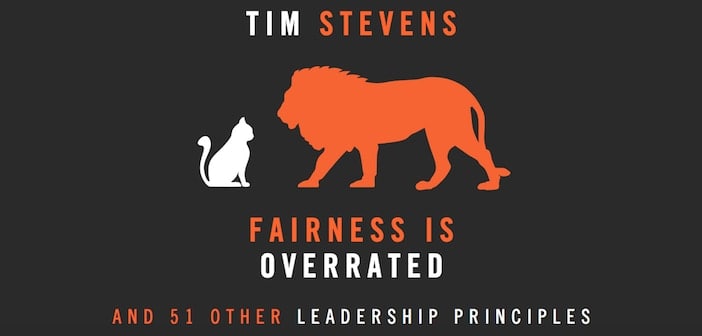This week, we connected with Tim Stevens to talk about his new book, Fairness Is Overrated:
TONY: What inspired you to write Fairness Is Overrated?
TIM: Leadership is really hard. I’ve watched leaders struggle as I spent 9 years in a para-church organization, then 20 years leading a church, and now as I’m working at the Vanderbloemen Search Group. It’s the same everywhere you look—and I wanted to write a down-to-earth, extremely practical, highly tangible guidebook for leaders who are in the middle of challenging situations everyday, whether they are a pastor, department director, CEO or school teacher.
TONY: In Part One: Be A Leader Worth Following, you talked about living a life with margins. Many church leaders are constantly racing from one urgent task to the next without making any true progress. How does adding margin help a leader clarify focus and reduce some of these tensions?
TIM: In my new job, I have a commute everyday to the office. If I leave myself plenty of time, all is good with the world. However, if leave at the very last minute and have an important meeting waiting for me—I’m a different kind of driver. I get frustrated at others—I drive faster and take more risks. I might even be known to wish evil upon the drivers around me. It’s because I left no margin. Margin in my finances gives me the space to respond to someone who is in need. Margin in my schedule gives me the time to listen to someone who needs to talk. Margin gives you the space to learn, grow and dream. Perhaps most important, margin increases the chance you will hear God prompting you to do something, say something, go somewhere. People around us know when we don’t have margin. They see us rushing around on a Sunday morning putting out fires or getting stuff done—and it’s obvious we don’t have time for them. But church is more than planning services and getting stuff done—it’s about reaching people where they are. And we can’t do that without margin.
TONY: What is the biggest mistake leaders make when trying to find the right people for their teams?
TIM: If I had to boil it down to one mistake, I would say paying too much attention to pedigree (where they’ve been, what they’ve done) rather than focusing equally, and maybe more, on chemistry and cultural fit. Chemistry is more important than skills, experience or education. You have to play well in the sandbox with others. You must have some basic interpersonal skills. I’ve worked with some people in the past who were highly skilled, had great experience, and did their jobs well—but no one wanted to be around them. It’s one of the things, Tony, that made it easy to bring you on the team at Granger. We had hung out together some. I knew your family, I liked your wife, and you were pretty cool, too. Yes, you came with a strong resume. But beyond that, the chemistry really worked. And that is vital in any organization where you are trying to accomplish something great. You must do it with people you like.
TONY: The third section of the book discusses building a healthy culture. What would you say to someone in a negative culture who is not the top leader of the organization? Is there still hope for changing culture at a lower level of leadership?
TIM: I believe any leader, at any level of the organization, can begin to shape and change culture. It won’t be over night, but with some inner strength and a bit of guidance, you can begin to model in your department the type of environment that others will notice. There is nothing worse than working in an organization that has a bad culture. If you’ve been there, you know that it doesn’t matter how much money you make; when you work in a toxic environment, you still come home tense and stressed at the end of each day. I won’t suggest that it will be easy. It’s always easier to lead when those above you have your back and are preaching the same leadership philosophy that you believe. But any leader, at any level, has the opportunity to create an environment where your team wakes up looking forward to getting back to work with people they enjoy being around. In Fairness is Overrated, the biggest section of the book is focused on helping leaders build a great culture.






